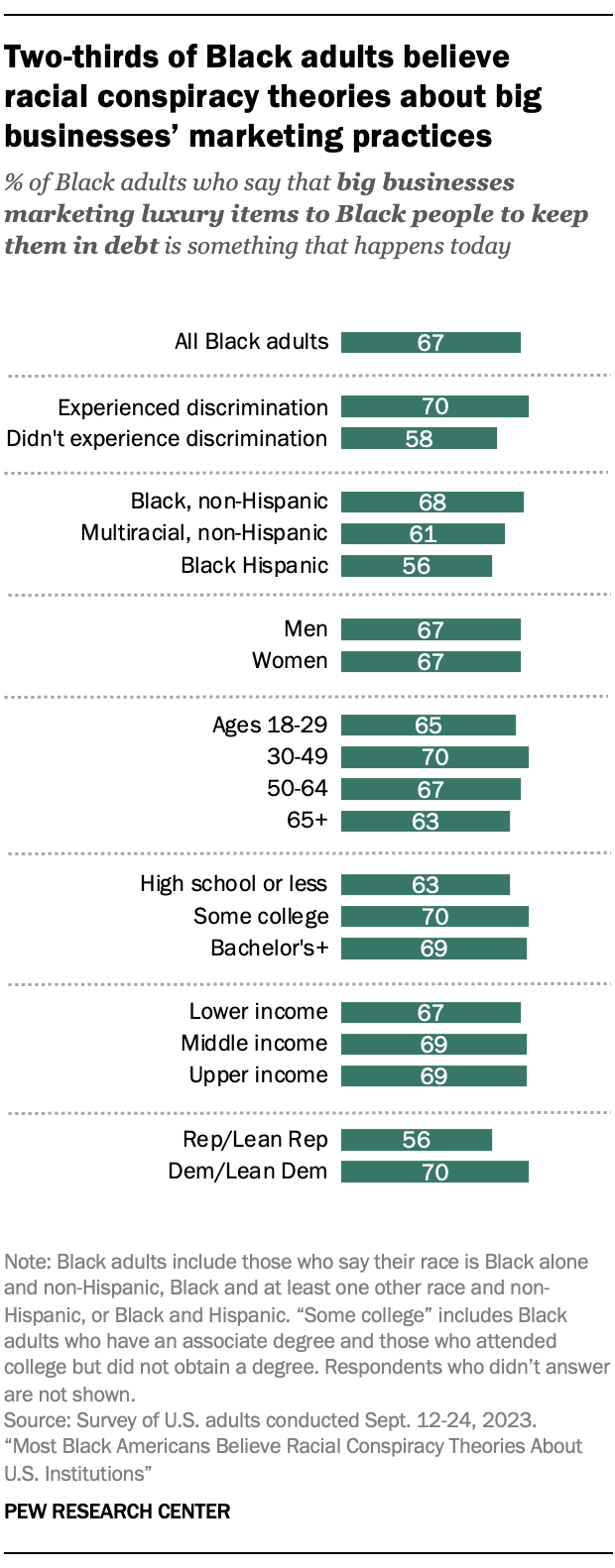Social scientists have long debated the causes of economic inequality among Black Americans. The conversation among Black people reached a notable inflection point in 2004, when comedian Bill Cosby linked persistent poverty in some Black families with the purchase of luxury items.
There is some evidence that poverty and expensive purchases are related in complex ways for Black people – namely, that race and residential segregation impact how people signal wealth. However, this broad conversation about the causes of persistent economic inequality provides some context for Black adults’ beliefs in racial conspiracy theories about the economic system.
Black Americans believe the economic system was designed to hold them back
What is a ‘racial conspiracy theory’?
In this report, the phrase “racial conspiracy theories” refers to the suspicions that Black adults might have about the actions of U.S. institutions based on their personal and collective historical experiences with racial discrimination.
About two-thirds of Black Americans (65%) say the U.S. economic system was designed to hold Black people back, either a great deal (39%) or fair amount (26%). Roughly a quarter (23%) say it was designed to hold Black people back somewhat, and 11% say it was not designed to hold Black people back much or at all.
By education and family income
Roughly 70% of Black adults who have been to college say the economic system was designed to hold Black people back. Fewer Black adults with a high school diploma or less education say the same (58%). And about two-thirds of Black adults at each income level say the economic system intentionally holds Black people back.
By gender and community type
Black adults also differ by gender on this question. Black women (67%) are slightly more likely than Black men (62%) to say the economic system was designed to hold Black people back. Black women under 50 (69%) are particularly more likely than Black men (61%) of their same age group to say this.
Black adults who live in urban areas (67%) are slightly more likely than those in rural areas (61%) to say the economic system significantly holds Black people back. Two-thirds (66%) of those in suburbs agree.
Familiarity with and belief in racial conspiracy theories about big businesses

Many Black Americans are familiar with racial conspiracy theories about the marketing practices of large corporations. Indeed, 70% of Black adults have heard the idea that big businesses market luxury items to Black people to keep them in debt. About a quarter of Black adults (27%) have not heard this idea.
Age is the only demographic difference among Black adults in their familiarity with this idea. Black adults ages 30 to 49 (72%) are slightly more likely than those 50 to 64 and 65 and older (67% each) to say they have heard that big businesses market luxury items to Black people to keep them in debt.
Many Black adults have not only heard of this idea, they also think malicious marketing of luxury items to Black people is something that happens today (67%). Only 10% say this happened in the past but does not happen today, and 17% say this has never happened.
Once again, age makes a difference. Black adults ages 30 to 49 (70%) are more likely than those 65 and older (63%) to believe targeted marketing of luxury items to Black people happens today.
Black adults who live in urban areas (71%) are slightly more likely than those in the suburbs (65%) to say they believe in this racial conspiracy theory about marketing.




